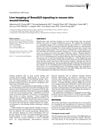 88 citations,
June 2016 in “Human Reproduction Update”
88 citations,
June 2016 in “Human Reproduction Update” New hormonal contraceptives are safer, have fewer side effects, and offer health benefits for women.
 11 citations,
January 2012 in “International Journal of Endocrinology”
11 citations,
January 2012 in “International Journal of Endocrinology” Insulin resistance is found in 20% of Thai women with PCOS, with age, waist size, skin changes, and abnormal blood fats increasing the risk.
 4 citations,
November 2020 in “Psoriasis : Targets and Therapy”
4 citations,
November 2020 in “Psoriasis : Targets and Therapy” The document concludes that proper treatment and management of plaque psoriasis in adolescents can improve their quality of life.
 22 citations,
October 2017 in “Australian & New Zealand Journal of Obstetrics & Gynaecology”
22 citations,
October 2017 in “Australian & New Zealand Journal of Obstetrics & Gynaecology” Many young Australian women think they have PCOS, but only a few are diagnosed correctly, causing unnecessary worry.
 37 citations,
February 2007 in “Clinical Obstetrics and Gynecology”
37 citations,
February 2007 in “Clinical Obstetrics and Gynecology” The document concludes that treating PCOS requires a combination of drugs to manage reproductive and metabolic symptoms, with more research needed on combination therapies.
 27 citations,
January 2013 in “Indian Journal of Dermatology, Venereology and Leprology”
27 citations,
January 2013 in “Indian Journal of Dermatology, Venereology and Leprology” PCOS is a complex disorder managed by treating symptoms and requires a team of specialists.
 28 citations,
July 2015 in “American Journal of Clinical Dermatology”
28 citations,
July 2015 in “American Journal of Clinical Dermatology” People with Lichen Planus, especially with mucosal involvement, are more likely to have Metabolic Syndrome, which increases their risk for heart disease and diabetes.
 48 citations,
July 2002 in “Journal of Cutaneous Medicine and Surgery”
48 citations,
July 2002 in “Journal of Cutaneous Medicine and Surgery” Skin problems are common and important signs of eating disorders and treating the eating disorder can improve these skin conditions.
 April 2016 in “Plastic and reconstructive surgery. Global open”
April 2016 in “Plastic and reconstructive surgery. Global open” The supplement highlighted advancements and challenges in plastic and reconstructive surgery, including the impact of smoking, chemotherapy, and new treatments like Tafluprost for hair loss.
 22 citations,
August 2011 in “Endocrine Practice”
22 citations,
August 2011 in “Endocrine Practice” Most hirsutism cases are due to PCOS, and treatment focuses on lowering testosterone and blocking its effects.
 January 2007 in “Journal of The American Academy of Dermatology”
January 2007 in “Journal of The American Academy of Dermatology” Eating disorders can cause hair loss in patients.
 January 2007 in “Journal of The American Academy of Dermatology”
January 2007 in “Journal of The American Academy of Dermatology” Eating disorders can cause hair loss.
 11 citations,
May 2003 in “Obstetrics and gynecology (New York. 1953. Online)/Obstetrics and gynecology”
11 citations,
May 2003 in “Obstetrics and gynecology (New York. 1953. Online)/Obstetrics and gynecology” Hirsutism in women often indicates a hormonal imbalance and can be managed with a combination of hormonal treatments and hair removal methods.
3 citations,
October 2023 in “Cosmetics” Healthy lifestyle changes can significantly improve skin health as you age.
36 citations,
July 1987 in “Journal of toxicology and environmental health” Rats fed heated oils had less weight gain, more organ damage, and showed signs of toxicity compared to those fed fresh oils.
January 2013 in “Medical & Pharmaceutical Journal of Chinese People's Liberation Army” January 2014 in “Shanghai Journal of Traditional Chinese Medicine” January 2014 in “Medical Innovation of China”  26 citations,
July 2003 in “Journal of Cutaneous Medicine and Surgery”
26 citations,
July 2003 in “Journal of Cutaneous Medicine and Surgery” Minoxidil solution safely and effectively treats hair loss.
 9 citations,
March 2021 in “Hormones”
9 citations,
March 2021 in “Hormones” COVID-19 may affect male fertility and women might have better outcomes due to hormonal and immune differences.
 60 citations,
October 2005 in “Experimental Dermatology”
60 citations,
October 2005 in “Experimental Dermatology” Zinc can both inhibit and stimulate mouse hair growth, and might help recover hair after chemotherapy.
 February 2015 in “Current Opinion in Endocrinology, Diabetes and Obesity”
February 2015 in “Current Opinion in Endocrinology, Diabetes and Obesity”  12 citations,
September 2007 in “Wound repair and regeneration”
12 citations,
September 2007 in “Wound repair and regeneration” Smad2/3-dependent TGF-β signaling increases during wound healing.
 36 citations,
March 1987 in “Pediatrics”
36 citations,
March 1987 in “Pediatrics” Minoxidil use during pregnancy can cause excessive hair growth and multiple birth defects in the baby.
 February 2021 in “Indonesian Journal of Perinatology”
February 2021 in “Indonesian Journal of Perinatology” Most pregnancies with SLE resulted in intrauterine growth restriction (IUGR).

Current treatments for alopecia areata often fail to achieve and maintain significant hair regrowth.
 9 citations,
February 2022 in “Dermatology and therapy”
9 citations,
February 2022 in “Dermatology and therapy” An emollient PLUS balm with ADE-G1 significantly improved skin dryness and quality of life in cancer patients with xerosis.
January 2013 in “Guiding Journal of Traditional Chinese Medicine and Pharmacy”  10 citations,
March 1992 in “European Archives of Psychiatry and Clinical Neuroscience”
10 citations,
March 1992 in “European Archives of Psychiatry and Clinical Neuroscience” Hair loss from mood stabilizers can grow back, but the reasons why are not fully understood.
7 citations,
April 2020 in “JIMD Reports” ATP6AP1‐CDG can cause hearing loss, hair loss, and protein issues, even in female carriers.























